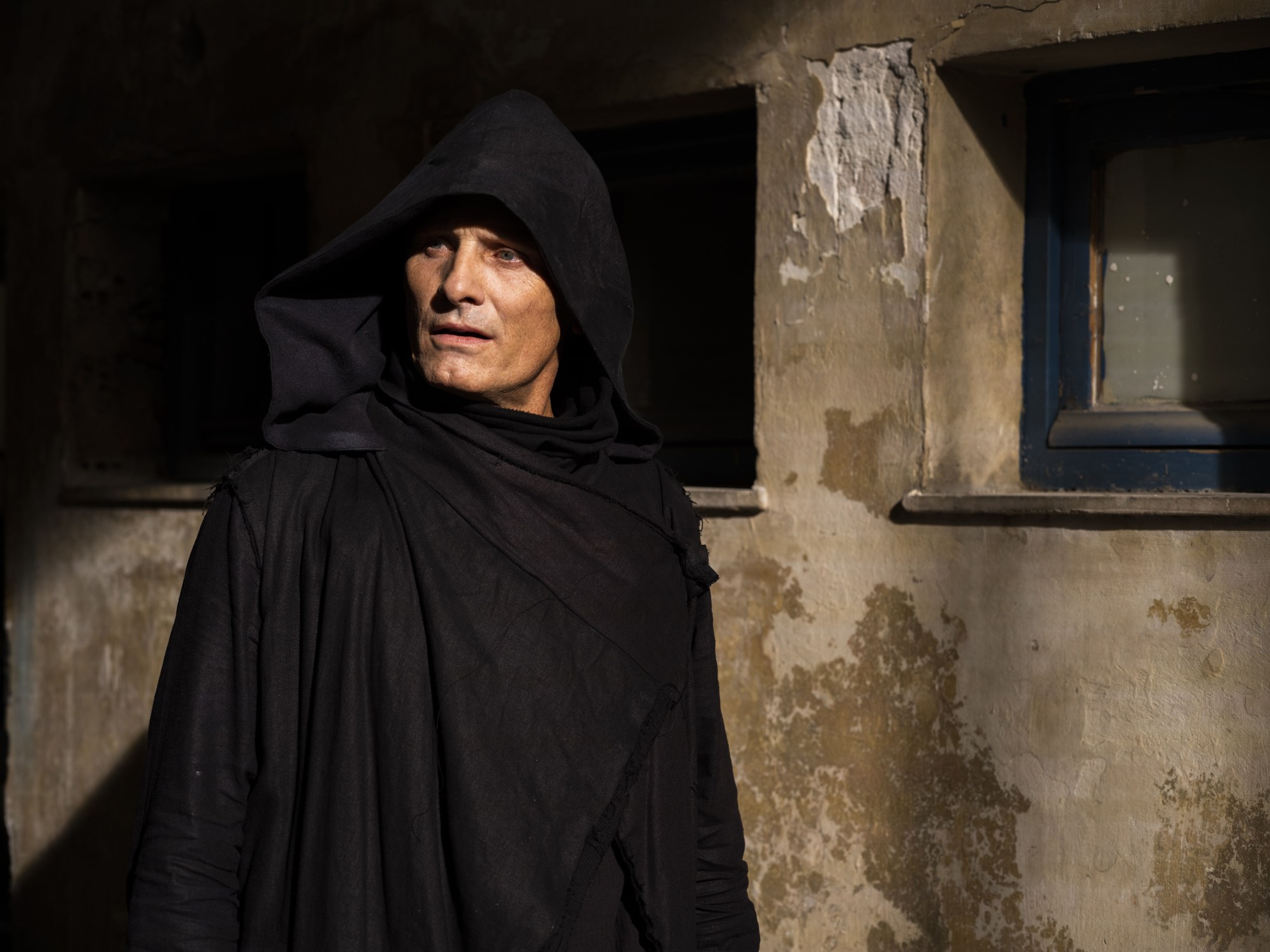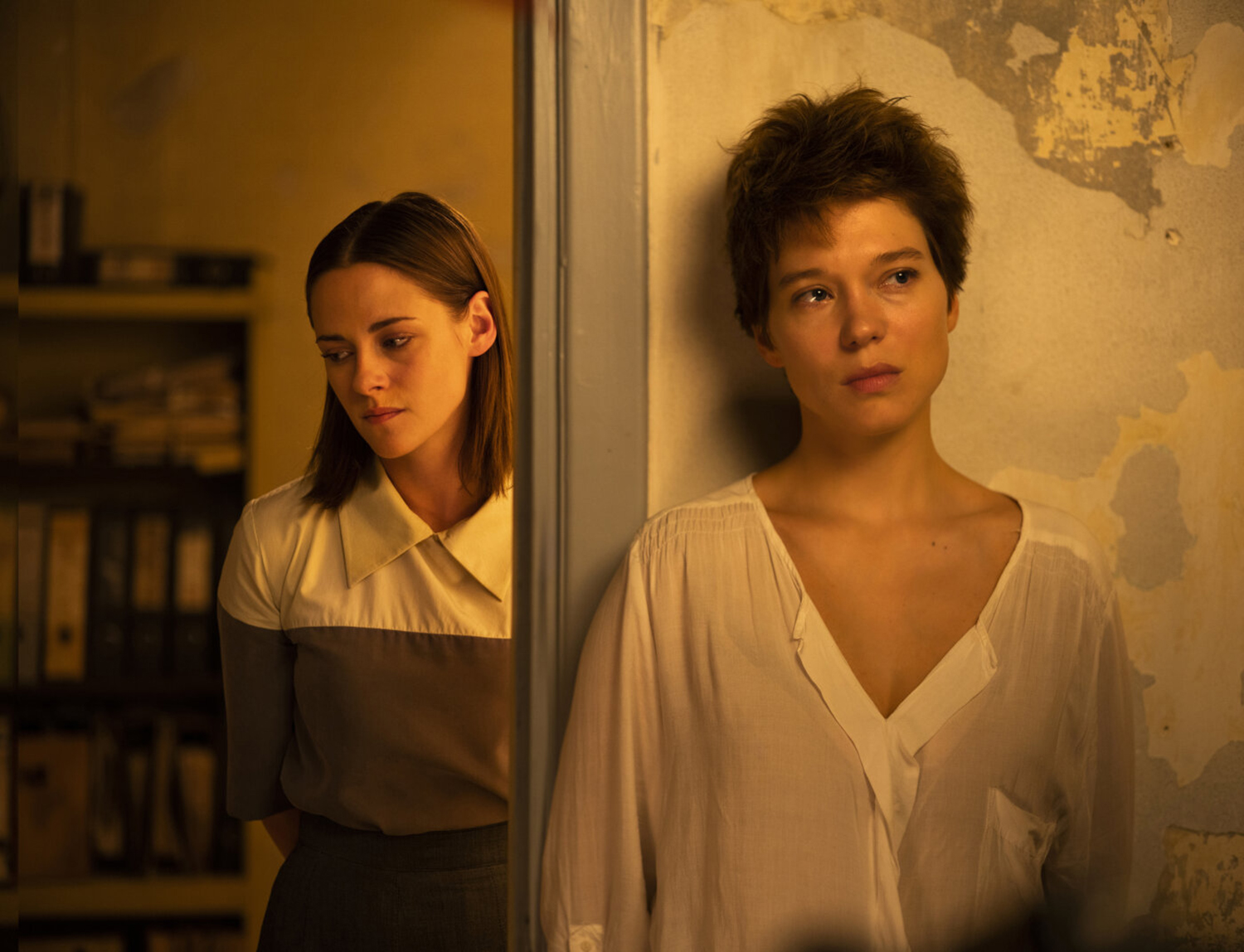‘Crimes of the Future’ premiered at the Cannes Film Festival 2022. This review contains mild spoilers.
Saul Tenser, a growling, elusive performance artist, hangs from the ceiling of his home in a bed that resembles a woodlouse on its back; a scooped out shell designed for a deep slumber. Claws stick like suction cups to his hands and feet, recognising the inner workings of his body. It’s important to keep track of that, the viewer of David Cronenberg’s new movie Crimes of the Future will soon realise. Without his unique innards, his assistant-slash-lover Caprice would argue, his art counts for nothing.
Saul Tenser’s art relies on his endless ability to grow new “neo-organs”, tumours that are tattooed and dissected by Caprice in front of an audience of ogling viewers who capture it on camera. It’s like a Marina Abramovic performance for the new, flesh-hungry age, and these exercises and scenarios unfold against a backdrop of dilapidated, paint-stripped interiors and rusted shipyards at night.

Within the world of this film, pain and provocation are seemingly void. Society is numb to almost everything; the acts that would have once caused discomfort now seem to cause eye-rolling, lip-licking levels of sexual ecstasy. A kiss? Old fashioned. Now, running a scalpel along skin and digging about in your partner’s guts is what brings them great pleasure. As Kristen Stewart‘s character, the mousy and librarian-like organ investigator Timlin, will soon put it: “Surgery is the new sex”.
With this idea in mind, David Cronenberg has crafted a perverted and erotic love story, perfectly casting Viggo Mortensen and Léa Seydoux as his gorgeous and rancid couple.
20 years have passed since David Cronenberg first wrote the script for this movie, but he was, at that point, no stranger to a cocktail of the erotic and barbaric. Years prior, in 1996, he brought a movie to the Cannes Film Festival that divided opinion, leaving some in awe and others in a state of disgust: Crash. The film, which received a similar reaction in the real world (but won the festival’s jury prize), envisioned a sex club exclusively for car crash victims who use the intense energy of that earth-shifting moment to reach carnal highs.
It pushed the auto-eroticism subgenre into the public’s consciousness, for better or worse, and influenced a coterie of legacy filmmakers working today, not least Julia Ducournau, whose vehicular fuckfest masterpiece Titane won the Palme d’Or in 2021.
And so the appetite for such shenanigans has clearly been whet: Crimes of the Future, again, captures what happens when flesh and metal meld. But this time, instead of these acts happening in secrecy, they’re staged.
The expectations for Crimes were high: test screenings held earlier this year suggested that there would be walkouts and fainting patrons in the aisles. Did that happen at the press screening of its world premiere? Yes, and it starts early.

The film begins with a dejected, plastic-eating boy seen as a “creature” by his mother being suffocated with a pillow. (The significance of this narrative is returned to later.) By the time the credits roll, we will have witnessed Saul and Caprice make orgasmic incisions in each other, see knives slice through sinewy flesh, a fresh wound get licked like a phallus, and watch a man with his eyes and mouth sewn up contort his body to electronic music, the dozens of ears attached to his skin an unsubtle metaphor for us to “listen” rather than look or see. It is as much a satire of the art world as it is a film about the limits of human desire, and how willing we are to push them both into sordid spaces.
For the most part, Kristen Stewart has a backseat in the movie; her characterisation of Timlin setting up the stage perfectly for a soon-to-come sexual revolution. But this isn’t an isolated incident: the seeds Crimes of the Future plants are seldom sowed; subjects and plot lines are passed by without a second thought. Much of it seems open-ended, as if the point is not what these characters are heading towards, but rather revelling in what they’re doing in the first place.
Philosophical absurdity tends to be David Cronenberg’s biggest strength, and whether you’re left stroking your chin in contemplation or running for the barf bag, there’s no denying that his new feature is silly, sexy and a creature of gorgeous design.
Follow i-D on Instagram and TikTok for more on the movies at Cannes Film Festival.

